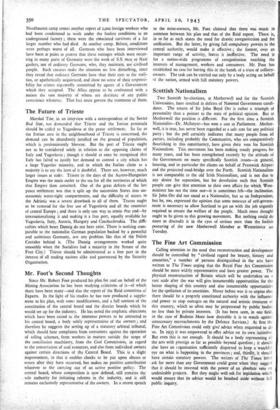Mr. Foot's Second Thoughts
Since Mr. Robert Foot produced his plan for coal on behalf of the Mining Association he has been studying criticisms of it—of which there have been many—and also the report of the Reid committee of Experts. In the light of his studies he has now produced a supple- ment to his plan, with some modifications, and a full accdunt of the constitution of the central board and the district boards which he would set up for the industry. He has noted the emphatic objections which have been raised to the immense powers to be entrusted to his central board, a body solely representative of the owners ; and therefore he suggests the setting up of a statutory arbitral tribunal, which should hear complaints from consumers against the operation of selling schemes, from workers in matters outside the scope of the conciliation machinery, from the Coal Commission, in regard to the conservation of coal resources, and also from individual owners against certain directions of the Central Board. This is a slight improvement, in that it enables checks to be put upon abuses or errors after they have occurred, but makes no positive contribution whatever to the carrying out of an active positive policy: The central board, whose composition is now defined, still remains the sole authority for initiating reforms in the industry, and it still remains exclusively representative of the owners. In a recent speech to the mine-owners, Mr. Foot claimed that there Was much in common between his plan and that of the Reid report. There is, in so far as each states the need for drastic reorganisation and for unification. But the latter, by giving full compulsory powers to the central authority, would make it effective ; the former, over an important range of activity, leaves it ineffective. The need is for a nation-wide programme of reorganisation touching the interests of management, workers and consumers. Mr. Foot has established no case for leaving this in the hands of a trust of colliery- owners. The task can be carried out only by a body acting on behalf of the nation, armed with full statutory powers.


























 Previous page
Previous page